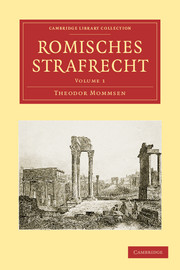Book contents
- Frontmatter
- Vorwort
- Inhaltsverzeichniss
- Berichtigungen
- Erstes Buch Das Wesen und die Grenzen des Strafrechts
- Zweites Buch Die Strafbehörden
- Drittes Buch Der Strafprozess
- Viertes Buch Die einzelnen Delicte
- Einleitung
- Erster Abschnitt Das Staatsverbrechen (perduellio, crimen maiestatis imminutae)
- Zweiter Abschnitt Häresie und Nichtchristenthum
- Dritter Abschnitt Der Mord und die gleichgestellten Verbrechen
- Vierter Abschnitt Vergewaltigung (vis)
- Fünfter Abschnitt Fälschung und Arglist
- Sechster Abschnitt Die geschlechtlichen Delicte
- Siebenter Abschnitt Geschenknahme und Erpressung der Sachwalter und der Beamten (crimen pecuniarum repetundarum)
- Achter Abschnitt Eigenthumsaneignung (furtum)
- Neunter Abschnitt Personalverletzung (iniuria)
- Zehnter Abschnitt Sachbeschädigung
- Elfter Abschnitt Missbrauch der Rechte
- Zwölfter Abschnitt Delictische Klagenconcurrenz
- Fünftes Buch Die Strafen
- Sachliches Register
- Register der behandelten Stellen
Achter Abschnitt - Eigenthumsaneignung (furtum)
Published online by Cambridge University Press: 05 March 2012
- Frontmatter
- Vorwort
- Inhaltsverzeichniss
- Berichtigungen
- Erstes Buch Das Wesen und die Grenzen des Strafrechts
- Zweites Buch Die Strafbehörden
- Drittes Buch Der Strafprozess
- Viertes Buch Die einzelnen Delicte
- Einleitung
- Erster Abschnitt Das Staatsverbrechen (perduellio, crimen maiestatis imminutae)
- Zweiter Abschnitt Häresie und Nichtchristenthum
- Dritter Abschnitt Der Mord und die gleichgestellten Verbrechen
- Vierter Abschnitt Vergewaltigung (vis)
- Fünfter Abschnitt Fälschung und Arglist
- Sechster Abschnitt Die geschlechtlichen Delicte
- Siebenter Abschnitt Geschenknahme und Erpressung der Sachwalter und der Beamten (crimen pecuniarum repetundarum)
- Achter Abschnitt Eigenthumsaneignung (furtum)
- Neunter Abschnitt Personalverletzung (iniuria)
- Zehnter Abschnitt Sachbeschädigung
- Elfter Abschnitt Missbrauch der Rechte
- Zwölfter Abschnitt Delictische Klagenconcurrenz
- Fünftes Buch Die Strafen
- Sachliches Register
- Register der behandelten Stellen
Summary
Die delictische Eigenthumsaneignung, das furtum der römischen Juristen, welches wir als Diebstahl zu bezeichnen nicht wohl vermeiden können, obwohl es dem Diebstahl des heutigen Rechts nur annähernd entspricht und namentlich auch die Unterschlagung umfasst, soil hier nach den folgenden Kategorien entwickelt werden.
Diebstahl überhaupt und insbesondere am Privatgut.
Ehegattendiebstahl (actio rerum amotarum).
Diebstahl am Götter- (sacrilegium) und am Staatsgut (peculatus).
Erntediebstahl.
Qualificirter Diebstahl der Kaiserzeit.
Erbschaftsdiebstahl.
Den gewaltthätigen Diebstahl, den Raub, hat das römische Recht nicht als selbständiges Verbrechen behandelt, sondern, ohne ihn von dem Diebstahl überhaupt auszuschliessen, daneben theils als Strassenraub zu der Mordklage (S. 629 fg.), theils in Vereinigung mit der gewaltthätigen Sachbeschädigung zu dem Delict der Vergewaltigung (S. 660 fg.) gestellt. – Die dem Diebstahl verwandte, aber nicht in denselben aufgehende Anmassung des Herrenrechts, der Menschenraub (plagium) ist diesem Abschnitt anhangsweise angeschlossen.
Der Diebstahl am Privatgut
Fur, griechisch ϕῴϱ, wörtlich der ‘Wegträger’, furtum, die Wegtragung und das Weggetragene, bezeichnen in ihrer aus-schliesslich delictischen Verwendung die widerrechtliche Eigenthumsaneignung. Diese Ausdrücke beschränken sich im technischen Gebrauch auf die Aneignung von Privatgut; indess sind die Aneignung des Göttereigenthums, technisch sacrilegium, wie diejenige des Staatseigenthums, technisch peculates, fast nur nomenclatorisch von dem privaten furtum verschieden und wird die letztere auch nicht selten bezeichnet als furtum pecuniae publicae.
- Type
- Chapter
- Information
- Römisches Strafrecht , pp. 733 - 783Publisher: Cambridge University PressPrint publication year: 2010



